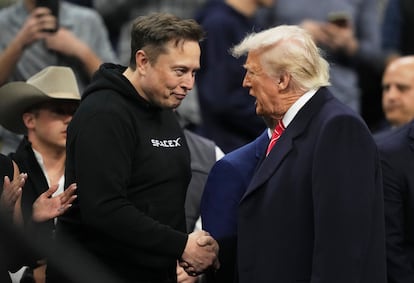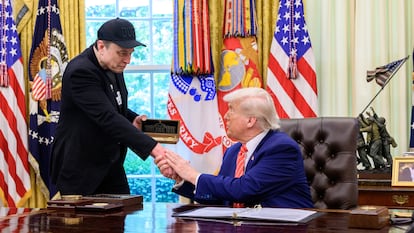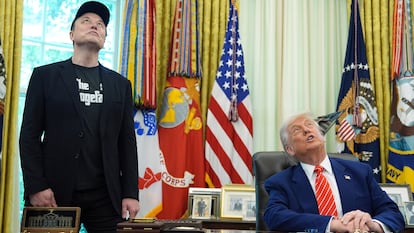From unconditional love to ‘total war’: Trump and Musk’s bromance and breakup in four acts
The public fallout brings to a close, at least for the moment, a high-profile alliance that their allies are now trying to rebuild


When historians of the future study and classify the figure of Donald Trump by era, it is very possible that among them they will highlight “the Elon Musk epoch.” And as historians know, rarely do eras end as cleanly, publicly, and violently as the era of the Trump-Musk bromance ended last Thursday, which united the destinies of the president of the United States and the richest man in the world. It took only a few hours and a handful of messages on the social networks they each own (Truth Social and X) to end their affair before a global audience, less than a year after it became official.
The argument that led to the split was over a Republican tax proposal — the “big, beautiful bill” as Trump, its great proponent, has called it. Currently being processed on Capitol Hill, it is central to the president’s legislative agenda, and proposes tax and healthcare cuts for nearly 11 million people, as well as an increase in the public deficit by, according to official estimates, $2.4 trillion. For that reason, Musk considers it “a disgusting abomination,” as he made clear last Tuesday on X. And it makes sense that he should. Until last week, the businessman was charged by Trump with the exact opposite: streamlining the U.S. administration as head of the Department of Government Efficiency (DOGE), a position he resigned from when he reached the legal limit of 130 days to serve as a special government employee.
Those comments prompted a response from Trump, who said he was “surprised and very disappointed” by them during a meeting with the new German chancellor, Friedrich Merz. It sparked a biblical-scale argument between the two, which included threats and personal insults.
According to a text message sent last Friday by hotelier Raheem Kassam, a Steve Bannon ally and one of the most influential figures in the MAGA world in Washington, the break-up amounts to “total war.” “There is no possibility of reconciliation,” he added, despite some media outlets reporting Saturday on maneuvers by collaborators of both magnates to mend fences or, at least, calm things down. For Kassam, who, like Bannon, has expressed his reservations about Musk’s influence on the global right in the past, his departure from the scene is “BIG NEWS” (his capital letters) for American conservatism.
The story of how the head of Tesla and SpaceX, among other companies, went from tweeting that he loved Trump “as much as a straight man can love another man” (February 7, 2025) to linking him, without evidence, in a post — which he ended up deleting on Saturday — with the pedophile Jeffrey Epstein (June 5), can be told as an extravagant tragedy in three acts and an epilogue, still unfinished.

Act One. The Courtship
Trump and Musk are 35 years apart in age, and they represent very different versions of the all-American archetype of the billionaire politician: the former bases his wealth on nepotism and the real estate and hotel business; the latter, born in South Africa and a U.S. citizen for just over a decade, on intangibles such as technology (Starlink), space exploration (SpaceX), a fossil-fuel-free future (Tesla), and controlling public discourse (X).
As a Silicon Valley resident, Musk was for many years more interested in his more or less visionary endeavors than in politics. He displayed a certain progressive bent on social issues and a libertarian creed based on an aversion to government interference in his affairs.
The unlikely couple met in 2017, and, like so many love stories, sparks didn’t immediately fly. It was at a meeting Trump held with tech entrepreneurs, just after he won an election in which Musk had voted for Hillary Clinton, but before he took office for the first time. After that meeting, they spoke separately. Musk, according to his authorized biographer Walter Isaacson, didn’t appreciate that the president-elect told him that a friend had given him a Tesla, but that he hadn’t yet driven it (perhaps not realizing that Trump, the son of another real estate developer, grew up traveling in a chauffeur-driven car). His subsequent description of his desire to revitalize NASA “threw him even further,” Isaacson writes. “He seems a little crazy,” Musk said of Trump after that meeting, “but maybe that’s not so bad.”
Elsewhere in his book, the biographer recounts another, even more disastrous, meeting with the next White House resident, Joe Biden, when he was Obama’s vice president. The businessman found the politician “tremendously boring,” which didn’t stop him from leaning toward voting for him in 2020 (although he ultimately abstained).
The “disdain” he felt the following year, when the Biden White House hosted an electric vehicle event to which Tesla wasn’t invited; the Democrats’ handling of the pandemic — during which time Musk rose to become the richest man in the world — and the “woke mentality virus” brought about a change in him similar to that of other Valley gurus.
In his case, this mutation led to the purchase of Twitter in October 2022, a social network he reduced to ashes and rebuilt without its previous moderation controls. As part of his new status as an “absolutist defender of freedom of expression,” he restored Trump’s account, which had been taken away at the end of his first term, following the assault on the Capitol. The changes to the algorithm ended up favoring the extremist rhetoric of the MAGA movement and, ultimately, contributed to the former president’s return to the White House.
It’s true that back then, there was almost no reason to think of such a return. Trump was at his lowest ebb after the Republican drubbing in the midterm elections. Musk, who first backed another horse, Florida Governor Ron DeSantis, was in those months sliding down “the rabbit hole of conspiracy theories,” to borrow the phrase from essayist Naomi Klein (via Lewis Carroll), only to find on the other side of the looking glass a sphere of MAGA influence where he felt comfortable, but that is now ready to turn its back on him.
Musk voted Republican for the first time in the Texas midterm elections. As DeSantis faded, he warmed to Trump with the help of another Silicon Valley baron and far-right figure, Peter Thiel. He finally threw his full support behind the Republican candidate on July 13, 2024, after Trump survived an assassination attempt at a rally in Butler, Pennsylvania.
Act Two: The Courtship of “Uncle Elon”
“Elon approached Trump motivated by two of his greatest interests: power and data,” explains Chuck Collins, a researcher at the Institute for Policy Studies, an expert on inequality and keen analyst of the South African-born magnate’s motivations, in a telephone interview. “At the helm of DOGE, he was able to fulfill his dream of accessing a vast amount of information on Americans that will be useful in his business dealings, as well as giving him a head start in the artificial intelligence race. As for power, I think he’s interested in owning the country, its skies, and its communications. I also think that along the way, the two developed a genuine friendship.”
Musk contributed a record amount to Trump’s campaign: more than $260 million. On October 5, he took action at a Trump rally, also in Butler, where the hallmarks of the new Musk, the “dark MAGA,” were evident: an outfit he would never abandon (a black blazer, T-shirt, pants, and Trump cap); the apocalyptic rhetoric; and the extravagant displays of enthusiasm, the shouting, the jumping, the bicep flexing, and, eventually, the seemingly Nazi salutes. An investigation by The New York Times, denied by Musk and his entourage, found part of the explanation for all this: the businessman’s drug use — he has publicly acknowledged using ketamine to combat depression — became “more intense,” setting off alarm bells for the Trump campaign.
In Pennsylvania, one of the seven swing states, the businessman launched a personal campaign, handing out million-dollar checks to motivate voters. He became inseparable from Trump, practically moving into the hotel at the Republican’s private residence in Mar-a-Lago, at the risk, which would prove real, of neglecting his businesses.
A week after Trump’s election victory, he proclaimed on his X account that he was “happy to be first buddy” of a politician famous for his first lady’s prolonged absences. A few days before that, Kai, the president-elect’s granddaughter, posted a photo with the tycoon with the caption: “Elon achieving uncle status.”
By September, the candidate had already found a mission for Musk: “A drastic overhaul” of the administration. In the weeks of the presidential transition, Musk’s influence in the MAGA world grew to the point of overshadowing the leader. Shortly before Christmas, a single round of calls to Republican congressmen was enough to bring the government to the brink of shutdown with his opposition to a temporary funding bill.
Back then, he seemed invincible and immune even to attacks from Bannon, the president’s man par excellence. Trump’s pride, for a man not given to sharing the spotlight, didn’t seem to be affected by the insinuations that the businessman was undermining his power. As in so many romantic relationships, they tried to confront their differences. Fortunately, Musk, having been born abroad, is legally barred from running for president.

Third Act: The Breakup
The businessman arrived at the White House with the promise of sending humans to Mars (making humanity an interplanetary species, along with unbridled procreation, is one of his obsessions) and convinced that the American people would acclaim him as a hero for abandoning his comfortable life as the richest man in the world to dedicate himself to necessary government reform at the helm of the DOGE. He recruited a team of young acolytes and set to work.
He gutted several federal agencies, caused incalculable global damage by slashing development cooperation with the closure of USAID, and forced the dismissal of thousands of civil servants. This sparked a wave of vandalism against Tesla cars and dealerships, along with protests with signs targeting Musk, millions in losses for his companies, and investor impatience with his political commitments. Meanwhile, Trump offered him the Lincoln Bedroom at the White House for overnight stays, treated him, according to the businessman, to unlimited amounts of ice cream, appeared with his ally and the latter’s son in the Oval Office, and came to his defense by turning the presidential residence’s gardens into an unprecedented advertisement for his Tesla vehicles.
The first cracks in the relationship came with public and private clashes with members of Trump’s cabinet. The reasons? The unpopularity of his cuts and the aggressive and volatile America First tariff policy, with which Musk, the entrepreneur, couldn’t agree. At the end of April, when losses jeopardized his position at the head of Tesla, he told Trump he needed to take some time off, and, like one of his SpaceX rockets, he began a gradual decoupling from Washington, a city he believed would be easier to conquer.
On May 30, Trump gave him an honorable send-off in the setting of so many happy moments, the Oval Office, despite Musk’s criticism of the “big, beautiful bill” a couple of days earlier. At that event, where the businessman appeared with a black eye — despite, as Trump later said, attempts to hide it with makeup — Musk promised he would remain “a friend and a collaborator” of the president.
When the cameras were turned off, Trump relayed to him, according to The New York Times, his discomfort with the fact that Jared Isaacman, Musk’s personal pick to lead NASA, had a recent history of donating to the Democratic Party. The next day, the president withdrew that nomination, and that, says the Times, was “a humiliation” for the owner of SpaceX, a company that has an extraordinary interest in who governs its main client, the U.S. space agency.
Musk spent the weekend in Montana at a meeting of technology leaders, from which he returned eager to continue his attacks on the tax bill. On Thursday, while Trump was speaking at the White House, the entrepreneur decided to kick the hornets’ nest live, ending his tirade by calling Trump ungrateful for not recognizing who he owed the presidency to, and predicting that the tariffs will tip the country into recession before the end of the year. Tesla shares fell 14%, and its boss lost $34 billion.
Act Four. Epilogue after the battle
The explosion of egos was followed on Friday by a strange calm and damage assessment: who has the most to lose? Musk is risking billions in federal contracts and risks investigations into his companies and his immigration status; if Trump 2.0 has demonstrated anything, it’s his thirst for revenge. This could be affected by the potential loss of supporters loyal the businessman, who has more than 220 million followers on X, a network whose algorithm could be altered to harm the president. Also at stake is the funding of Republican candidates, to which the magnate had committed before the midterm elections in 2026.
“That someone like Musk has dared to stand up to the big boss can serve as an example to those who oppose his domination of the Republican Party but are afraid to speak out,” Collins believes. For the inequality expert, Thursday’s row and criticism of the tax bill are symptoms of the “many fractures that are opening up in the coalition that brought Trump to power.” “There are also fractures in the closing of ranks among the oligarchic class with his administration, due to tariffs and economic chaos, and they will likely widen if this tax reform is successful. There are two teams in that oligarchy: the disruptors, who seek short-term profits, and those interested in a functional system that allows them to make money in the long term.”
Trump spent Friday sending messages to Musk through intermediaries, those traditional Washington media outlets he despises. He also signaled that he had moved on, that he was “no longer thinking about Elon.” On Truth Social, he preferred to talk about other matters, such as his planned White House ballroom remodeling. Musk, for his part, managed to stay quiet for once on X, which he used much less than usual.
“Trump is the king of MAGA emotions. Musk is the king of MAGA infrastructure, and they need each other,” warns Eric Schiffer, a brand and reputation strategist and technology investor, in a telephone conversation from Los Angeles. He views this dispute like a professional wrestling match, a kind of pantomime that ends “in a handshake.” “The first poll [by YouGov, conducted that same Friday] says that 48% are optimistic about a reconciliation,” Schiffer recalls. “I think it can only happen if someone contributes to bridging the gap between the two. For example, [White House crypto czar] David Sacks. For that to be possible, things will have to calm down first.”
Curiously, Collins also uses the analogy of mixed martial arts. “Let’s not forget that these two thrive on conflict,” he says, before recalling that this type of combat sport, more violent than wrestling, was one of the passions Musk and Trump shared as their relationship was developing. They often went to fights together. Last Saturday, Trump enjoyed another fight, in which Sean O’Malley was seeking revenge against Merab Dvalishvili in Newark. This time, Trump went alone, without his “first buddy.”
Sign up for our weekly newsletter to get more English-language news coverage from EL PAÍS USA Edition
Tu suscripción se está usando en otro dispositivo
¿Quieres añadir otro usuario a tu suscripción?
Si continúas leyendo en este dispositivo, no se podrá leer en el otro.
FlechaTu suscripción se está usando en otro dispositivo y solo puedes acceder a EL PAÍS desde un dispositivo a la vez.
Si quieres compartir tu cuenta, cambia tu suscripción a la modalidad Premium, así podrás añadir otro usuario. Cada uno accederá con su propia cuenta de email, lo que os permitirá personalizar vuestra experiencia en EL PAÍS.
¿Tienes una suscripción de empresa? Accede aquí para contratar más cuentas.
En el caso de no saber quién está usando tu cuenta, te recomendamos cambiar tu contraseña aquí.
Si decides continuar compartiendo tu cuenta, este mensaje se mostrará en tu dispositivo y en el de la otra persona que está usando tu cuenta de forma indefinida, afectando a tu experiencia de lectura. Puedes consultar aquí los términos y condiciones de la suscripción digital.








































